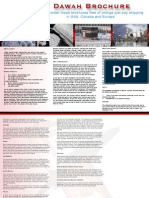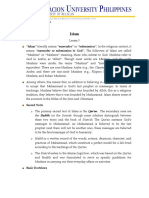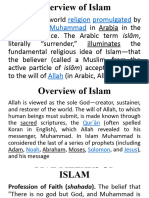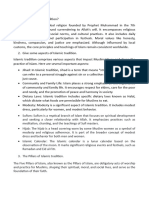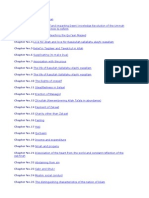Section One - The Muslim Faith 1.1 Understanding The Faith
Section One - The Muslim Faith 1.1 Understanding The Faith
Uploaded by
Tudorache VioletaCopyright:
Available Formats
Section One - The Muslim Faith 1.1 Understanding The Faith
Section One - The Muslim Faith 1.1 Understanding The Faith
Uploaded by
Tudorache VioletaOriginal Title
Copyright
Available Formats
Share this document
Did you find this document useful?
Is this content inappropriate?
Copyright:
Available Formats
Section One - The Muslim Faith 1.1 Understanding The Faith
Section One - The Muslim Faith 1.1 Understanding The Faith
Uploaded by
Tudorache VioletaCopyright:
Available Formats
This guide provides basic and general information about the muslim way of life and is best utilized
in conjunction with specifically designed workshops for various service providers. Section One The Muslim Faith 1.1 Understanding the faith Islam means submission or surrendering to God. It also means peace. The followers of Islam are called Muslims. Islam is a way of life (deen) that impacts every part of life, from eating and sleeping to working and playing. It is not only a personal religion, but also a social one. Therefore, it sometimes becomes hard to distinguish between cultural and religious practices of Muslim people. Under an Islamic system all people are first and foremost accountable to God. Allah is the Arabic word for God. No distinction is made between countries, nationalities or social classes. Muslims seek to live in accordance with God's laws. By doing so, they strive to obtain nearness to God and victory over temporary trials and temptations in this world. All aspects of their practice including prayer, fasting, charity, and pilgrimage are intended to help meet this goal. Although strict by secular standards, Islam is not an ascetic religion. Islam requires its followers to be active participants in their communities. For a Muslim to work and study are considered acts of worship as these are activities that contribute to the advancement and betterment of society. Even simple actions such as removing a harmful obstacle from a path are considered a rewarding action! Muslims believe that God is One, indivisible, and also believe in all the prophets that Christians and Jews believe in including Adam, Noah, Abraham, Ishmael, Isaac, Jacob, Joseph, Job, Moses, Aaron, David, Solomon, Elias, Jonah, John the Baptist, and Jesus (peace be upon them all). Muslims believe that the final Prophet is Muhammad (peace be upon him) to whom the Quran was revealed. It needs to be highlighted that a Muslims actions does not necessarily equal Islam. As with all religions, Muslims practice their faith to varying degrees. Some people are very strict in their practices whereas others are not. Regardless of a persons degree of Islamic implementation all Muslims will unanimously agree on the fundamental principles and beliefs. 1.2 Basic Principles and Beliefs The Prophet Muhammad (Peace Be Upon Him): Muhammad (PBUH) was born in Makkah in the Year 570. His father died before his birth, and his mother shortly afterwards. His uncle was the one who raised him. As he grew up he became known for his truthfulness, generosity and sincerity, so much so that he was given the nicknames Al-Amin (the Trustworthy) and Al-Saadiq (the Truthful). At the age of 40 while engaged in a meditative retreat, Muhammad (PBUH)
received his first revelation from God through Angel Gabriel. This revelation, which continued for 23 years, is known as the Quran. The Quran: According to Islam, the Quran is a record of the exact words revealed by God through the Angel Gabriel to the Prophet Muhammad (PBUH). It was memorized by Muhammad (PBUH) and then dictated to his companions, and written down by scribes, who crosschecked it during his lifetime. Not one of its 114 chapters has been changed over the centuries. The Quran is the main source of a Muslims faith and practice. The Qurans basic theme is the relationship between God and His creatures, but it also deals with all the subjects that concern us as human beings: wisdom, doctrine, worship, and law. The Sunnah is the practice and example of the Prophet Muhammad (PBUH). This is the second authority for Muslims after the Quran. Compilations of Ahadith (singular: Hadith a reliably transmitted report of what the Prophet Muhammad (PBUH) said, did or approved of) and his life history form the Sunnah. Thus, Muslims follow the Quran (the word of God) and the Sunnah (the example set by Prophet Muhammad). The Five Pillars of Islam: All Muslims have to fulfill the five major requirements known as the Five Pillars of Islam. These form the framework of a Muslims life and they are: 1. Testimony of Faith (Shahadah) All Muslims will declare their faith by proclaiming: La illaha illalah Muhamadur rasullulalah- There is none worthy of worship except Allah and theProphet Muhammad is his messenger. This declaration is called the Shahadah. 2. Ritual Prayer (Salat) Salat is the name for the obligatory prayers, which are performed five times a day, which are a direct link between the worshipper and God. The five daily prayers provide a meditative re-direction of persons thoughts. This achieves a renewed sense of purpose, spiritual fulfilment and physical rejuvenation. These five prayers contain verses from the Quran and other phrases praising God said in Arabic, the language of the revelation. Prayers are said at dawn, noon, midafternoon, sunset and nightfall/before retiring to bed. Although it is preferable to worship together in the mosque, Muslim may pray almost anywhere but they pray in the direction of the Kaaba which is a cube shaped building, which God commanded Abraham to build over four thousand years ago. Muslims may pray alone or in a group. There is no clergy in Islam, but a learned person (known as the Imam) who knows the Quran usually leads prayers. 3. Obligatory Charity Tax (Zakat) It is a religious duty for every Muslim to give a portion of his/her wealth to the needy each year. These alms are called Zakat in Arabic, which literally means purification.
Paying these alms is a way for people to purify the ethically gained wealth that God has bestowed upon them and it is also a means to distribute wealth throughout the society. It also purifies the soul of the giver, reducing greed and strengthening compassion and generosity. 4. Fasting (Sawm) Every year in the ninth Islamic month called Ramadan, all Muslims fast from first light until sundown, abstaining from food, drink and sexual relations. Since the lunar calendar is 11 days shorter than the solar calendar, the month of Ramadan gradually passes through all seasons of the year. Those who are sick, elderly, or on a journey and women who are pregnant or nursing are permitted to break the fast and make up an equal number of days later in the year. By abstaining from worldly comforts, even for a short time, a fasting person gains true sympathy with those who go hungry as well as gaining growth in ones spiritual life. 5. Pilgrimage (Hajj) The annual pilgrimage to Makkah- called the Hajj- is an obligation only for those who are financially and physically able to perform it. Nevertheless, approximately 3 million people go to Makkah each year from every corner of the globe providing a unique opportunity or those of different nations to meet one another. Pilgrims wear special clothes: simple garments which strip away distinctions of class and culture and all stand equal before God. The Hajj is the major example of the universal message of Islam and its teachings on equality. 1.3 Main Islamic Occasions Friday Just as Christians observe Sundays and Jews observe Saturday as their religious day, for Muslims it is Friday. The noon prayer is a special time where people congregate at the mosque if they are able to and pray together. Ramadan - Ramadan is the ninth month of the Muslim calendar. It is during this month that Muslims observe the Fast of Ramadan. Lasting for the entire month, Muslims fast (through avoidance of food, drink and intimacy) during the daylight hours and in the evening eat small meals and visit with friends and family. It is a time of worship and contemplation. It is a time to strengthen family and community ties. Muslims usually break their fast with some water and dates. During Ramadan, Muslims read the entire Quran, and perform special prayers called Taraweeh after the daily nighttime prayer. Eid ul-Fitr - The beginning of the Islamic holiday called Eid ul-Fitr or "feast of fast breaking" marks the completion of the month-long period of fasting during the blessed month of Ramadan. During Eid ul-Fitr Muslims rejoice over a month-long achievement of fasting, which was performed for the sole purpose of pleasing and serving Allah. For a Muslim, Eid is a day of thanksgiving and gratitude, and marks personal triumph over one's desires. On the morning of Eid ul-Fitr, normally before the start of prayer, Muslims are to pay Zakat ul-Fitr (charity) to the needy of the community -- an alms for the month of Ramadan. Eid is a happy time for Muslims. Many decorate their
homes to celebrate this blessed holiday and frequently invite and visit friends and loved ones. Big feasts are made for guests, and Muslims usually prepare trays of delicious sweets to be shared with neighbours and the local community over coffee and tea. Eid ul-Adha - The Festival of Sacrifice Eid ul-Adha takes place on the tenth day of the twelfth month of the Islamic calendar and is a time of much celebration. The holiday commemorates Prophet Abraham's willingness to sacrifice everything for God. This celebration coincides with the yearly pilgrimage to Hajj and is where Muslims will organise (if they have the means) for an animal to be sacrificed and the meat is shared amongst family, friends and the poor. Section Two Interacting with Muslims 2.1 Islamic greetings and responses Muslim greetings: The Salaam is a distinctive aspect of a Muslims social conduct. Greeting someone with Salaam is a kind of invocation for his welfare and blessings. It instills brotherly love and strengthens the ties of brotherhood and closeness, and mutual relationships result in a strong and unwavering society. Muslims greet by saying the following: The Greeting: As-salaamu Alaikum Peace be upon you The Reply: Wa-alaykum Salaam And may peace be upon you too. A non-Muslim may greet his/her Muslim friend/client and associates in any way that is considered acceptable and decent in society. 2.2 Creating a receptive environment Below are a few to keep in mind while seeing Muslim people: Feel free to ask questions if unsure about anything; Muslims would most likely appreciate your interest and care on that matter and feel happy to explain their beliefs. Because cleanliness is of utmost importance, Muslims are more receptive to clean environments. Do not be offended if a Muslim guest/client refuses something, for e.g. refusing to eat meat if they are unsure if its halal or not. Do not be offended if a Muslim doesnt shake your hand (if you are of the opposite sex) or avoids eye contact or keeps to small talk (i.e. doesnt go personal, avoids any unnecessary chatter) this is just for the purpose of modesty. Generally Muslims do not celebrate or partake in events such as Christmas, Easter, New Years Eve, Birthday parties, Good Friday etc. Religious books (e.g. the Quran) should be handled with respect. Avoid insulting any of the Prophets or God Including any physical depictions or pictures. Avoid joking about any Islamic practices and beliefs.
Avoid physical contact with a Muslim member of the opposite gender, where possible. 2.3 Facilities /Venues requirements at conferences or other gatherings Prayer room facilities should be available and a prayer timetable (or sunrise and sunset times) made available for your guests/clients Muslims pray in the direction of the city of Mecca (in Saudi Arabia) wherever they are. The direction of Mecca is known as the Qibla (approximately 295 from North clockwise). It will greatly assist your guests/clients if you show them the direction of the Qibla. A suitable room for prayer is one, which is clean, private and has no statues or pictures of animate objects. Bathroom facilities (i.e. taps) to perform ablution should be available and water for use inside the cubicles (for washing the private parts). Section Three Etiquette 3.1 Diet Halal Food: Halal - The Arabic word (Halal) means lawful. In the Holy Quran, Allah commands Muslims and all of mankind to eat of the Halal things Animals such as cows, sheep, goats, deer, moose, chickens, ducks, birds, etc., are Halal, but they must be Zabihah (slaughtered according to Islamic Rites) in order to be suitable for consumption, hence the term Halal Meat. The meat should be purchased from a Certified Halal Supplier/Butcher, as they hold a special certification, which must meet certain guidelines in order to be certified supplier. Examples of foods that are already halal in their natural state include: Milk (from cows, sheep, camels, and goats), Honey, Fish, Plants which are not intoxicant, Fresh or frozen vegetables, Fresh or dried fruits, legumes and nuts like peanuts, cashew nuts, hazel nuts, walnuts, etc. Grains such as wheat, rice, rye, barley, oat etc. Haram (Forbidden) Muslims are forbidden to consume: Pork (Swine) Blood Carnivorous animals Almost all reptiles and insects The bodies of dead animals Halal animals that are not slaughtered according to the Islamic Law. Wine, Ethyl Alcohol, and Spirits (and other intoxicants). Some foods may also contain animal derivatives, which are not Halal. Examples include biscuits, ice cream (gelatine and animal fats) and cheese (animal rennet).
3.2 Clothing Customs Guidelines of proper modesty for males and females (dress and behavior) are based on revelatory sources (the Qur'an and authentic Sunnah) and as such are seen by believing men and women as divinely based guidelines with legitimate aims, and divine wisdom behind them. They are not male imposed or socially imposed restrictions. Each culture and country where Muslims live will have his or her own clothing style. It should be noted that there is a distinction between religion and culture. Muslim Women and Clothing: A Muslim woman is not required to fully cover in the presence of her husband and close family or among females. However, when she goes out or when men other than her husband or close family are present, she is expected to maintain certain requirements for the purpose of her modesty and respect such as: Only the face and hands are shown (covering the face and hands is optional according to most scholars). Headscarf is obligatory; Clothing should be loose and opaque to not reveal the shape of the figure Muslim Men and Clothing: Muslim men are required to: Fully cover the area between the navel and knees Wear clothing loose enough as to not describe what he is covering Wear clothing not designed in way to attract attention. Here the basic rule of modesty and avoiding show off applies to all believing men and women in Islam. In addition men are discouraged from wearing silk and gold.
You might also like
- Mostafa Mahmoud - Dialogue With An Atheist (English)Document93 pagesMostafa Mahmoud - Dialogue With An Atheist (English)Ahmed Magdy El-Sayed100% (2)
- All About IslamDocument11 pagesAll About IslamKedren Kent JawoodNo ratings yet
- Converted CFC Youth For Christ Song Chords CompilationDocument30 pagesConverted CFC Youth For Christ Song Chords CompilationJuan BagoNo ratings yet
- VocabDocument10 pagesVocabJulie MerrillNo ratings yet
- Halley's Study Bible Gospel of John SamplerDocument14 pagesHalley's Study Bible Gospel of John SamplerBible Gateway100% (2)
- ARABIC&ISLAMICDocument15 pagesARABIC&ISLAMIConlyjaeyNo ratings yet
- Salaah Janazah HanafiDocument10 pagesSalaah Janazah Hanafiadilsaeed2001No ratings yet
- Introducing Islam (A Beginners Guide To Islam)Document6 pagesIntroducing Islam (A Beginners Guide To Islam)Sasier K. GokoolNo ratings yet
- The Religion of IslamDocument24 pagesThe Religion of IslamRijaa Fatima100% (1)
- Islam The Religion of PeaceDocument29 pagesIslam The Religion of Peaceannetheresemangobos03No ratings yet
- Group 3 Islam1Document19 pagesGroup 3 Islam1Kimberly Jeanne AlunanNo ratings yet
- SSP MDL4Document3 pagesSSP MDL4Marian Grace GonzalesNo ratings yet
- About Ram Ad AnDocument3 pagesAbout Ram Ad Anscorpio2006No ratings yet
- What Is Ramadan?: Month of The Muslim Islamic Lunar Calendar. CharityDocument3 pagesWhat Is Ramadan?: Month of The Muslim Islamic Lunar Calendar. Charityscorpio2006No ratings yet
- Islamic Spirituality: Reporters: Mohamed Rihab D. Cali Norjana M. MinalangDocument31 pagesIslamic Spirituality: Reporters: Mohamed Rihab D. Cali Norjana M. MinalangAkazukin AineNo ratings yet
- Tugas Bahasa InggrisDocument4 pagesTugas Bahasa InggrisRosita RositaNo ratings yet
- Brochure Teach IslamDocument2 pagesBrochure Teach Islamsarfaraz055No ratings yet
- What Is Islam?: Followers of Islam Are Called MuslimsDocument12 pagesWhat Is Islam?: Followers of Islam Are Called MuslimsHira ShahzadiNo ratings yet
- Islam: Five Pillars of IslamDocument3 pagesIslam: Five Pillars of IslamRahima ShresthaNo ratings yet
- LESSON 5 - IslamDocument5 pagesLESSON 5 - IslamVictor Noel AlamisNo ratings yet
- Introducing Islam: An Introduction To Basic Islamic Belief and PracticesDocument5 pagesIntroducing Islam: An Introduction To Basic Islamic Belief and PracticesMhmd ElkurdiNo ratings yet
- Islam 2Document10 pagesIslam 2maan bocaoNo ratings yet
- Pillars of IslamDocument7 pagesPillars of IslamTiviyah MoganNo ratings yet
- Module Islam - Grade 8Document6 pagesModule Islam - Grade 8Mikael Cabanalan FerrerNo ratings yet
- ISLAMDocument7 pagesISLAMhendrix.casper20No ratings yet
- Pillars of IslamDocument7 pagesPillars of IslamMuhammad Umar ButtNo ratings yet
- Five Pillars of Islam de ReadingDocument3 pagesFive Pillars of Islam de Readingapi-665170814No ratings yet
- Islam ReportDocument44 pagesIslam ReportNikNo ratings yet
- Syed Hasan Dawar, BB-29010 Hum-121 Islamiat & Pak - Studies: Name & ID: Course Code: Course TitleDocument6 pagesSyed Hasan Dawar, BB-29010 Hum-121 Islamiat & Pak - Studies: Name & ID: Course Code: Course TitleWaris WaheedNo ratings yet
- Five Pillars Reading PacketDocument4 pagesFive Pillars Reading PacketMissKuoNo ratings yet
- The Five Pillars of IslamDocument6 pagesThe Five Pillars of IslamSafira fitriNo ratings yet
- Foundation in Islamic FinanceDocument74 pagesFoundation in Islamic FinanceAishah SisNo ratings yet
- Darya SH HW 1Document2 pagesDarya SH HW 1Saleh AlizadeNo ratings yet
- Islamic Society and CultureDocument64 pagesIslamic Society and CultureEdsel BuletinNo ratings yet
- Frequently Asked Questions About IslamDocument8 pagesFrequently Asked Questions About Islamapi-3810515No ratings yet
- Understanding Islam: My Reading Choices - Saleh A. AlsulaimanDocument7 pagesUnderstanding Islam: My Reading Choices - Saleh A. AlsulaimanDumitru ClaudiuNo ratings yet
- IslamDocument5 pagesIslamKurtis ChomiNo ratings yet
- The Five Pillars of Islam - 819 Words - Essay ExampleDocument2 pagesThe Five Pillars of Islam - 819 Words - Essay Examplefa22-bph-010No ratings yet
- Introduction and Basic Fundamentals of IslamDocument5 pagesIntroduction and Basic Fundamentals of Islamm.aNo ratings yet
- How Islam Worship Allah1Document6 pagesHow Islam Worship Allah1John BompatNo ratings yet
- Skip To Content: FacebookyoutubeinstagramtwitterDocument13 pagesSkip To Content: FacebookyoutubeinstagramtwitterRMK BrothersNo ratings yet
- The Muslim Community in Scouting: Item Code FS185024 Dec/02 Edition No 2 (103518)Document5 pagesThe Muslim Community in Scouting: Item Code FS185024 Dec/02 Edition No 2 (103518)Ergi WidyastutiNo ratings yet
- Ramadan EssayDocument5 pagesRamadan Essayjamshed khanNo ratings yet
- Islam PPT Outline (Script)Document2 pagesIslam PPT Outline (Script)Paulene MaeNo ratings yet
- Proiect EnglezaDocument8 pagesProiect EnglezaAdina CristinaNo ratings yet
- IslamDocument3 pagesIslamarshalynjimlaeNo ratings yet
- ExplainedDocument2 pagesExplainedTyba314No ratings yet
- HUM110 Handouts Lecture18Document4 pagesHUM110 Handouts Lecture18danishali1090No ratings yet
- The Five PillarsDocument22 pagesThe Five PillarsVera YsabelNo ratings yet
- The Chronicle of IslamDocument11 pagesThe Chronicle of Islamjassermeneses2k21No ratings yet
- Islam and Social WorkDocument10 pagesIslam and Social WorkSamira HassanNo ratings yet
- The Ramadan Fast: Universiti Kebangsaan Malaysia Fakulti Undang-UndangDocument30 pagesThe Ramadan Fast: Universiti Kebangsaan Malaysia Fakulti Undang-Undangmusbri mohamedNo ratings yet
- Islamic Practices Formerly Five PillarsDocument3 pagesIslamic Practices Formerly Five PillarsJohn Toni OrtizNo ratings yet
- Islam Revision - PracticesDocument17 pagesIslam Revision - Practicessindhu ovNo ratings yet
- 5 Pillers of IslamDocument1 page5 Pillers of IslamRahulMotipalleNo ratings yet
- 5 Pillars of IslamDocument5 pages5 Pillars of IslamWanderer leeNo ratings yet
- IslamDocument42 pagesIslamPaulene MaeNo ratings yet
- HUM110 Handouts Lecture16 PDFDocument5 pagesHUM110 Handouts Lecture16 PDFZahra FatimaNo ratings yet
- Brent ZZZDocument7 pagesBrent ZZZabrajanoquennieNo ratings yet
- Worship in IslamDocument11 pagesWorship in IslamAyman HassanNo ratings yet
- What is Islam? Interesting Facts about the Religion of Muslims - History Book for 6th Grade | Children's Islam BooksFrom EverandWhat is Islam? Interesting Facts about the Religion of Muslims - History Book for 6th Grade | Children's Islam BooksNo ratings yet
- Absen Tashih GuruDocument6 pagesAbsen Tashih GuruDimas Ariyanto Zulfikar100% (1)
- A Disconcerting Prayer On The Originality of Luke 23 34a - NATHAN EUBANKDocument17 pagesA Disconcerting Prayer On The Originality of Luke 23 34a - NATHAN EUBANKTheunis HolthuisNo ratings yet
- Three Arguments On Moon Sighting (Recommended)Document2 pagesThree Arguments On Moon Sighting (Recommended)Kamran HamadNo ratings yet
- Chapter 13: Christianity: World Religions: A Voyage of DiscoveryDocument13 pagesChapter 13: Christianity: World Religions: A Voyage of Discoverysaintmaryspress100% (1)
- A Very Simple Guide To The Catholic MassDocument13 pagesA Very Simple Guide To The Catholic MassGemma acostaNo ratings yet
- Lesson 5 - The Major ProphetsDocument4 pagesLesson 5 - The Major ProphetsMarc Lenson EtangNo ratings yet
- Tanach by The NumbersDocument2 pagesTanach by The NumbersRabbi Benyomin Hoffman100% (1)
- Islamic Way of Living by AwadudDocument63 pagesIslamic Way of Living by AwadudAyofe Imran Abu BanaatNo ratings yet
- The Doctrine of AhluSunnah Vs The Ashari MovementDocument156 pagesThe Doctrine of AhluSunnah Vs The Ashari Movementmarmar9250% (2)
- Hayatul MuslimeenDocument109 pagesHayatul MuslimeenRamz AftabNo ratings yet
- Bible ChronologyDocument7 pagesBible ChronologydinudatruthseekerNo ratings yet
- God Is Not Mad at You by Joyce Meyer WalmartDocument3 pagesGod Is Not Mad at You by Joyce Meyer WalmartShannon100% (1)
- #1130 - The Christian's Great BusinessDocument8 pages#1130 - The Christian's Great Businessitisme_angelaNo ratings yet
- God Is A WomanDocument5 pagesGod Is A Womanrojojojo frantroNo ratings yet
- Zadokites - : Zadok The High PriestDocument3 pagesZadokites - : Zadok The High PriestGideon OsoroNo ratings yet
- Apocalyptic and Other Materials Suliman BashearDocument36 pagesApocalyptic and Other Materials Suliman Bashearasadghalib1No ratings yet
- Seeing in The Spirit - Phillip Rich PDFDocument46 pagesSeeing in The Spirit - Phillip Rich PDFnetgames2u9590100% (3)
- Introduction To World Religions and Belief Systems Lesson 3Document14 pagesIntroduction To World Religions and Belief Systems Lesson 3Adrian BarberanNo ratings yet
- Document From Umar SheikhDocument17 pagesDocument From Umar Sheikhareesha alamNo ratings yet
- Channels Only: WORDS: Mary E. Maxwell Alt. MUSIC: "Channels" Ada R. Gibbs, Pub.1900. Public DomainDocument1 pageChannels Only: WORDS: Mary E. Maxwell Alt. MUSIC: "Channels" Ada R. Gibbs, Pub.1900. Public DomainHankandKaren ZeckNo ratings yet
- Lord Chaitanya Mahaprabhus South India Tour PDFDocument159 pagesLord Chaitanya Mahaprabhus South India Tour PDFRaveen Sachdev100% (2)
- Biblico Theological ReflectionDocument22 pagesBiblico Theological ReflectionLea TanNo ratings yet
- Way To Salvation in The Light of Surah Al-AsrDocument56 pagesWay To Salvation in The Light of Surah Al-AsrBooks for Islam100% (1)
- Daily Power and Prayer DevotionalDocument447 pagesDaily Power and Prayer DevotionalKevon Michael Arthur ThomasNo ratings yet
- Compilation of Inspirational Bible VersesDocument66 pagesCompilation of Inspirational Bible Verseseine10No ratings yet
- 19 HeavenDocument3 pages19 HeavenJohn S. KodiyilNo ratings yet

















